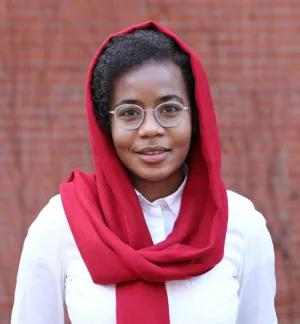Healthcare in Focus: Political Hurdles and Policy Progress in Africa
Session 5 of the Africa Beyond the Headlines study group
Session 5 of the Africa Beyond the Headlines study group
Related Programs
Over the course of five sessions, this study group, led by Dr. Gloria Ayee, is exploring the pivotal moment experienced by the African continent. With youthful populations, abundant resources, and growing economic and technological capacity, Africa holds solutions to global challenges from food security to climate change. Participants of the study group are invited to reflect on the role that international cooperation must play in supporting inclusive, sustainable development in Africa, as well as to move beyond outdated perspectives and learn about Africa’s profound transformation through trade, investments in clean energy and health, and youth empowerment initiatives. Participants are also given the opportunity to prepare one policy memo on a topic related to one of the sessions and to provide a memo briefing the study group and to a relevant external expert guest.
On April 23, the final session examined healthcare access policies and public health initiatives across Africa. In our discussions, we explored the politics of health and healthcare policy, particularly in light of the COVID-19 pandemic. We identified political barriers to expanding healthcare coverage and access, and the dialogue centered on areas of progress in addressing infectious and chronic diseases. Beyond focusing on the challenges in implementing effective healthcare policies, in this session we invited participants to propose policy solutions as we look towards the future. The study group counted with the presence of external expert guest Dr. Salma Abdalla. Dr. Abdalla is a Sudanese medical doctor and Assistant Professor in Global Health and Epidemiology at Boston University School of Public Health. She was the Director of the Rockefeller-Boston University 3-D Commission on Determinants of health, Data science, and Decision making. She also served as a secretariat member for the WHO Independent Panel for Pandemic Preparedness and Response during the COVID-19 pandemic. Furthermore, Katie Chen, Master in Public Administration/ International Development Candidate at Harvard Kennedy School, delivered a memo briefing on how to boost childhood immunization rates in African countries, including through increased vaccine manufacturing, drone delivery., and behavioural interventions to combat vaccine hesitancy.
Health and health equity outcomes in Africa are heavily influenced by social determinants and face significant barriers. The first barrier is the informal nature of the economies in most African countries, which prevents governments from generating sustainable income through tax collection and hampers efforts to account for populations in healthcare provisions. A second barrier is the difficulty in convincing political leaders of the high importance of efficient healthcare systems from both public health and development perspectives. A third barrier lies in public sentiment about the importance of healthcare, with studies indicating that people in Nigeria and Egypt do not expect their political representatives to invest sufficiently in healthcare. Lastly, a fourth barrier is linked to the international financial system itself, which often favors vertical health service programs that focus on specific facilities, leading governments to prioritize these at the expense of expanding comprehensive healthcare systems.
The COVID-19 pandemic and its impact in Africa underscored the value of previous outbreak experiences, with countries familiar with handling diseases like Ebola responding more effectively. The Africa CDC's role in fostering collective action and peer learning further represented a pivotal component that, combined with the continent’s young demographic that experienced milder COVID-19 effects, led to a better pandemic response than initially expected. Another key lesson that arose during pandemic response in Africa and worldwide was trust levels in governments, which influenced public adherence to health guidelines.
Efforts to expand drone delivery of healthcare products in countries like Rwanda exemplify the adaptation of technology to meet health needs on the continent. This complements the existing strengths of the continent's healthcare systems, notably a robust primary healthcare sector that has effectively prevented diseases and enhanced maternal health. Countries like the United States can learn from this focus as it can help enhance healthcare provision and reduce costs.
The migration of healthcare workers from Africa, often referred to as the 'brain drain,' poses a significant challenge to expanding quality healthcare provision in the continent. Controversial policies, like Nigeria’s restrictions on doctor emigration, highlight the need for better structural solutions. Moreover, the role of international NGOs, while supportive, sometimes hinders long-term health system strengthening, emphasizing the need for sustainable capacity-building. The urgent need for local vaccine production and procurement represents a crucial policy focus area that could fundamentally strengthen health systems in response to future epidemics. Moreover, attracting private sector investment to scale up programs should be pursued, albeit priority must be given to the establishment of efficient and high-quality public healthcare systems in the continent.
Further opportunities also exist in cross-sectoral investment in programs that strengthen healthcare systems while addressing other pressing issues in Africa. Large climate financing focusing on mitigation and adaptation can yield co-benefits that help address health outcomes. Similarly, engaging the youth in healthcare policy not only harnesses their energy but also ensures that future health systems reflect the demographic's needs and ideas, moving beyond tokenistic involvement to genuine empowerment.
By addressing these multifaceted challenges through innovative strategies and robust policy integration, Africa can build more resilient healthcare systems that serve as models for both developing and developed nations.
Martín Rodríguez , Alejandro. “Healthcare in Focus: Political Hurdles and Policy Progress in Africa.” Belfer Center for Science and International Affairs and Women in Public Policy Program, Harvard Kennedy School, April 25, 2024
Healthcare in Focus: Political Hurdles and Policy Progress in Africa
Martín Rodríguez , Alejandro. “Healthcare in Focus: Political Hurdles and Policy Progress in Africa.” Belfer Center for Science and International Affairs and Women in Public Policy Program, Harvard Kennedy School, April 25, 2024


From Africa Futures Project
